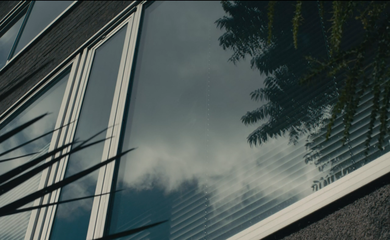What if in this age of austerity all the modernist homes of the urban intelligentsia were actually spacecraft? What if these chameleon constructs were housing the agents of bourgeois gentrification? Artists H and D (conceptual artist Liam Gillick and “Slits” guitarist Viv Albertine) may look like human beings, talk like human beings, walk like human beings, but there is something missing, something disconnected, broken off and unformed when these facsimiles were first manufactured.
Their house nests discreetly on a London street, stealthily hording its equity. Inside H and D each command a deck, workspaces connected by a spiralling metal spine, plotting their trajectory through a nameless crisis. H inhabits the upper floor reflecting his superior status as an artist. Below in her red engine room D listens to the restless wheels on his office chair rolling back and forth across the floor, furniture code communicating his sexual desires.
This grand design is everything to them: mother, father, child and prison. Trees nuzzle the windows, nature trying to intrude or reclaim two chilly souls who have become too hip and detached to connect with the outside world. The ambient sounds of the city seep in-between those carefully chosen materials, constructed to offer the illusion of superiority. D curves her body around the lines of the house, a spirit level to her ghosts. What exactly did she have to sacrifice to the house of her dreams?
H reads to her in bed, dramatic, romantic wooing her like a warrior poet. How quickly men disappoint, H is a bad drunk wanting to stalk the streets like a performance Oliver Reed. D pursues him through a lovelorn sense of exhausted duty. On another rare venture outside H lays face down in the park like a toddler recovering from a tantrum and D capitulates, “Did I do something? Did I say something?” H is a tortured soul, an artist in need of inspiration delivered through drama. Or does he just need to get back in the room and man up?
When confronted by the indifference of the working class to his question of space, H disappears in a huff of middle class indignation. He’s humiliated in his Smart car by a painter and decorator, the refusal to acknowledge his stature an insult to his sensibilities.
Or is it all a performance to ignite D’s own creative flame that has wavered over time, snuffed out by the shadow of H’s melancholy? Do her masturbatory peep shows pave the way for her comeback onto the artistic scene?
Joanna Hogg’s third film “Exhibition” confirms her as that rare creature, a British auteur director. Hogg’s considered angles and generous takes reward with sly humour and detached pathos. Often in “Exhibition” we see reflections within reflections, a puzzle box of illusionary ideas that often confuse us to where the camera is actually placed, is it inside or outside a particular space? What does the house actually think of H and D? As Edward Hopper said, “If I could say it in words there would be no reason to paint.”

